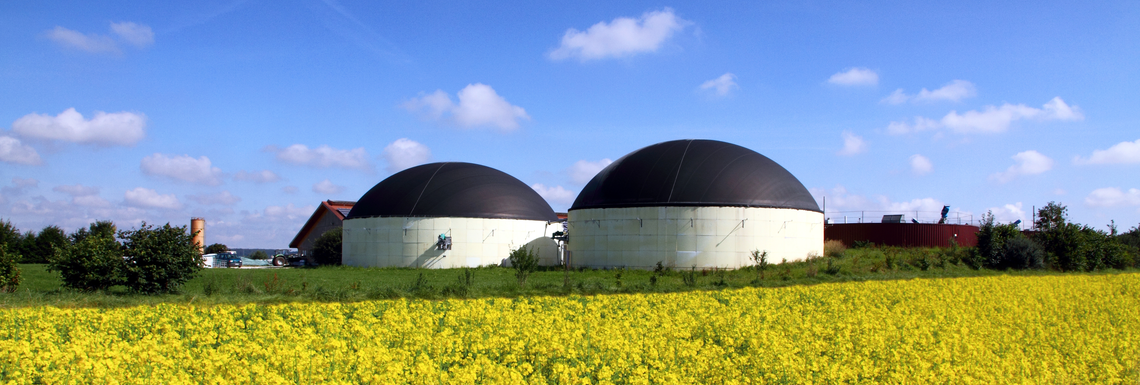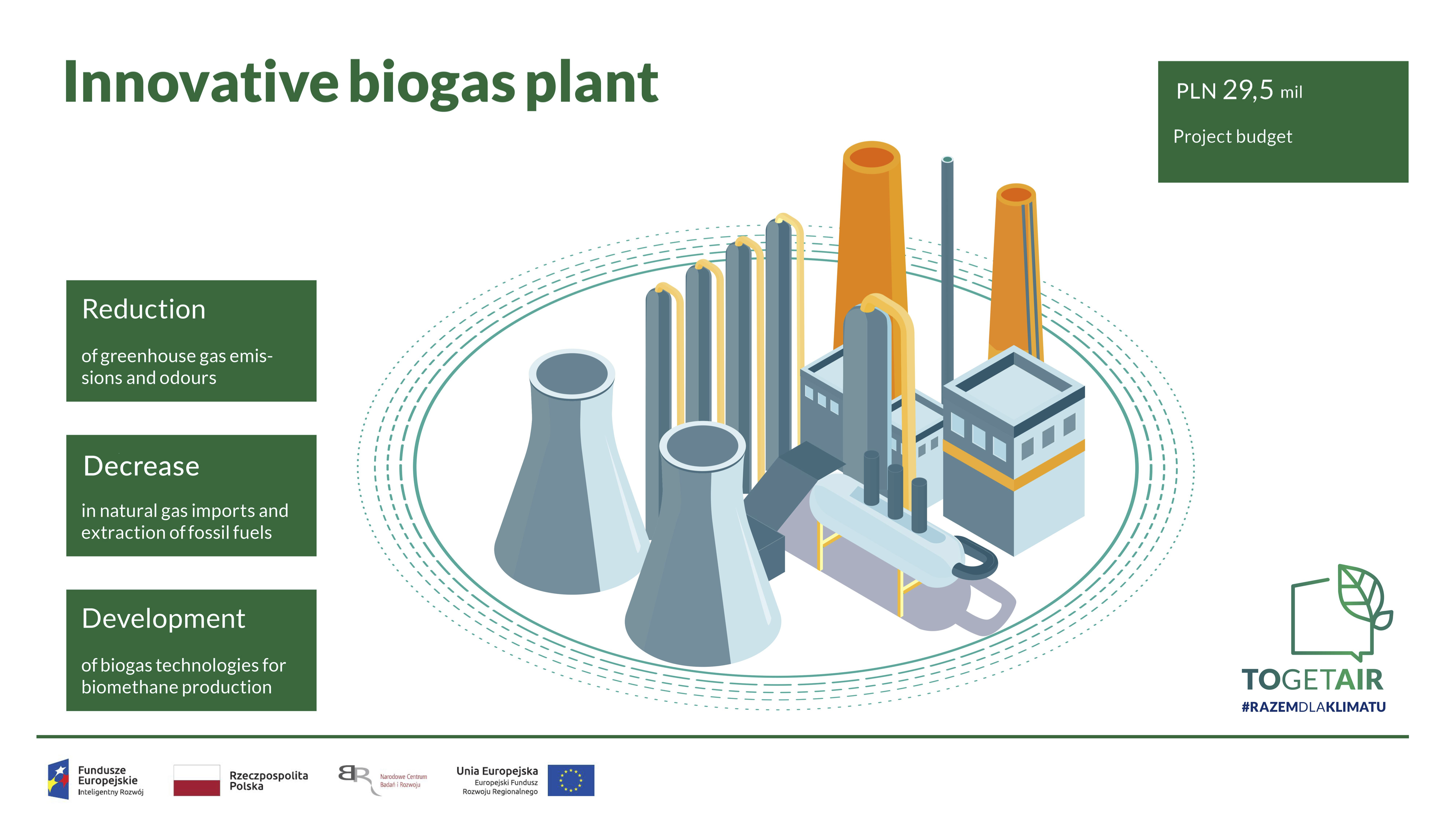European Green Order in practice. Innovative biogas plant one of the new projects of the National Research and Development Centre
Over the years, the European Union has taken a number of initiatives and actions to reduce the pressure of its member states on the environment. However, the milestone in this regard will be entering into force of the European Green Order. It is a draft "climate law" presented by the European Commission in April 2020, which orders the EU to strive to achieve complete climate neutrality by 2050 and subordinates all other EU initiatives to this goal.
This approach has far-reaching implications, as it means that in the next several decades, electricity and heat will not be produced as a result of burning coal, oil or natural gas, but based on emission-free sources, such as wind, sun or biomass. At the same time, the processes related to the production, distribution, storage and use of energy will be characterized by an individualized approach to the recipient and respect for inhabitants and the environment.
Polish innovations in the fight for a green future
The National Centre for Research and Development has launched eight projects in order to meet the changing reality and consider the evolution directions that provide the national economy with the framework of the European Green Order. They will result in the appearance of innovative solutions and complete technologies on the market. The common goal of these initiatives is to accelerate the country's transformation towards a modern zero-emission economy, where raw materials for energy production, energy distributors and energy itself are perceived as elements of a closed cycle of matter. Its individual elements change their form and role, but are used efficiently each time.

Implementation of projects under the innovative public procurement procedure (Pre-Commercial Procurement - PCP), allows the NCRD to co-finance research and development works focused on specific, previously defined research problems and to define key expectations for the expected solutions. Technical dialogues preceding the beginning of PCP procedures allow to learn the opinions and comments of potential contractors and to effectively specify the requirements, considering the specificity of the domestic market. In addition, the design of the project in this form strengthens the opportunities for the market use of the results of scientific research carried out in the program, because the construction of technology demonstrators and full-scale testing of prototype solutions are important elements.
The project that will be presented in this section of the report is the Innovative Biogas Plant. However, it is first worth mentioning the other projects from this unique group. The wastewater treatment plant of the future creates a new view of the wastewater stream as a source of energy and raw materials to be reused. Energy and process-efficient construction focuses on prefabricated and modular solutions that allow buildings to be erected incomparably faster than traditional technologies, while ensuring significantly higher energy efficiency and media use. The goal of the Heat and Cold Storage project is to develop innovative technologies for heat or cold storage, which will allow the management of surplus and waste energy and increase the security of heat supply. Electricity storage focuses on two aspects of an innovative energy storage - development of a cell and a system to manage its operation. The main goal of the Ventilation for schools and homes project is to develop a technology of decentralized mechanical ventilation with heat recovery and an air purification system. Microretention aims at providing the market with ready-made systems for collection, pre-treatment and management of rainwater and grey water. The CHP plant of the future is a project the key element of which will involve the modernization of the existing heating system in such a way that it is ultimately based primarily on renewable energy and has the ability to store surplus energy. At least one technology demonstrator will be created as a part of each of these projects.
Energy from biogas

The aim of the Innovative Biogas Plant project is to develop an innovative technology of universal biogas plant, stably converting various organic substrates into biomethane, characterized by full energy self-sufficiency and no hydrogenation. As a basis for the verification of submitted ideas, the NCBR has formulated several dozen requirements within the competition, quality and optional categories to assess applicants' offers, as well as a number of obligatory requirements, the fulfillment of which determines participation in the project. In addition, a set of different substrates was selected, which will ensure that the technologies designed on their basis will not only be able to work stably on all other substrates, but also allow them to be changed without compromising the efficiency of the process. The four best applicants will be selected to participate in the project. After the research and development stage, they will be obliged to build fractional-technical installations to present the developed technologies in practice and be assessed whether the work parameters declared in the offer can be reflected in reality. These installations will also make it possible to check the efficiency of methane and biomethane production by the technology during the six-month test phase, carried out on the basis of the aforementioned substrates. In addition, they will allow to determine which of the contractors has the most credible offer and whose technology will be demonstrated on a full scale. However, the NCBR considered it important that all fractional-technical installations must function also after the end of the project and constitute an additional effect of the project as a kind of mini-demonstrators of innovative solutions.

The mission of the NCBR is to support Polish research units and enterprises in developing their ability to create and use solutions based on the results of scientific research and research and development work. For this reason, the Centre plans to implement the Innovative Biogas Plant in cooperation with Strategic Partners - an entity selected in a separate procedure, which will support the Centre in the field of technical and biotechnological issues as well as in the implementation of tests and maintaining the proper functioning of all installations after the end of the project.
Positive impact on the environment, society and economy

The Innovative Biogas Plant project meets a number of assumptions of the European Green Order strategy in such aspects as biodiversity protection, reduction of fertilizer consumption, decarbonisation of the energy system, implementation of a circular economy, protection of soil well-being, shortening the supply chain of fossil fuels, and efficient and sustainable use of biomass.
The Innovative Biogas Plant project is implemented from European Funding - the Intelligent Development Operational Program as part of the non-competitive project entitled Raising the level of innovation in the economy by implementing research projects under the innovative public procurement procedure in order to support the implementation of the European Green Order strategy (under sub-measure 4.1.3 Innovative research management methods of the Intelligent Development Operational Program).
Editors NCBR




